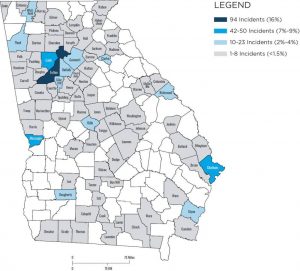 On January 10, 2018, the Williams Institute at UCLA School of Law released the first-ever report of HIV criminalization in the US state of Georgia. The report follows previous studies examining available data on all arrests or prosecutions resulting from enforcement of HIV criminalization laws in a single jurisdiction. These studies have been conducted to fill gaps in understanding how laws are enforced because tracking cases can be very difficult. There is no national database recording arrests or prosecutions under HIV criminalization laws, reporting systems vary by state and city, and the quality and comprehensiveness of records can vary even within jurisdictions.
On January 10, 2018, the Williams Institute at UCLA School of Law released the first-ever report of HIV criminalization in the US state of Georgia. The report follows previous studies examining available data on all arrests or prosecutions resulting from enforcement of HIV criminalization laws in a single jurisdiction. These studies have been conducted to fill gaps in understanding how laws are enforced because tracking cases can be very difficult. There is no national database recording arrests or prosecutions under HIV criminalization laws, reporting systems vary by state and city, and the quality and comprehensiveness of records can vary even within jurisdictions.
Among the first studies collecting comprehensive data was an examination of all persons charged with criminal HIV exposure and aggravated prostitution within the Nashville, Tennessee prosecutorial region between 2000 and 2010. Researchers found that the majority of people charged and convicted for these HIV criminal offenses in the Nashville region were poor, from marginalized groups, and often suffered from addiction, mental health, and homelessness issues. Furthermore, researchers found that over one-third of the HIV exposure arrests involved non-sexual incidents such as biting or spitting and nearly half of the prostitution cases involved solicitation of oral sex; these behaviors pose minimal or no risk of HIV transmission.
More recently, the Williams Institute examined criminal offender record information (CORI) data for all persons came in contact with the California criminal justice system from 1988 to 2014 under HIV criminalization laws. The Williams Institute found that HIV criminalization in California disproportionately impacted women and people of color. For example, 44 percent of the people arrested, charged, or prosecuted under HIV criminalization laws in California were women, even though women only make up 13 percent of the state population of people living wit HIV. Similarly, 51 percent of people living with HIV in California are Black or Latino/a, but 67 percent of people experiencing HIV criminalization are Black or Latino/a. These data helped to inform the successful effort to modernize California’s criminalization laws in October 2017, with reforms taking effect on January 1, 2018. The reforms include requiring prosecutors to demonstrate that a defendant had a specific intent to transmit HIV and reducing the penalty for not disclosing HIV-positive status prior to sexual activity from a felony charge punishable by up to 8 years of imprisonment to a misdemeanor punishable by up to six months in jail.
Findings on HIV criminalization in Georgia are consistent with these prior studies. Like the data in Nashville and California, the data in Georgia point to race-, sex-, and geographic-based disparities in the application of HIV criminalization laws. Yet a distinctive finding was high rates of enforcement in rural areas of Georgia. In some smaller counties, as many as 10 percent of the residents living with HIV had experienced an HIV-related arrest.
Below are some of the main findings from the Williams Institute report on HIV criminalization in Georgia. You can read the report here.
- From 1988-2017, there were 571 HIV-related arrests in Georgia.
- Georgians with HIV in rural areas were more likely to be arrested for an HIV-related crime than those living in urban areas.
- Black men were more likely to be convicted of an HIV-related offense than White men.
- When considering the demographics of people living with HIV in Georgia, White women were more likely to be arrested for an HIV-criminal offense than other groups.
- Convictions for HIV arrests were three times as likely when there was a concurrent sex work arrest.
- Sex work offenses were more likely to involve women and particularly Black women.



